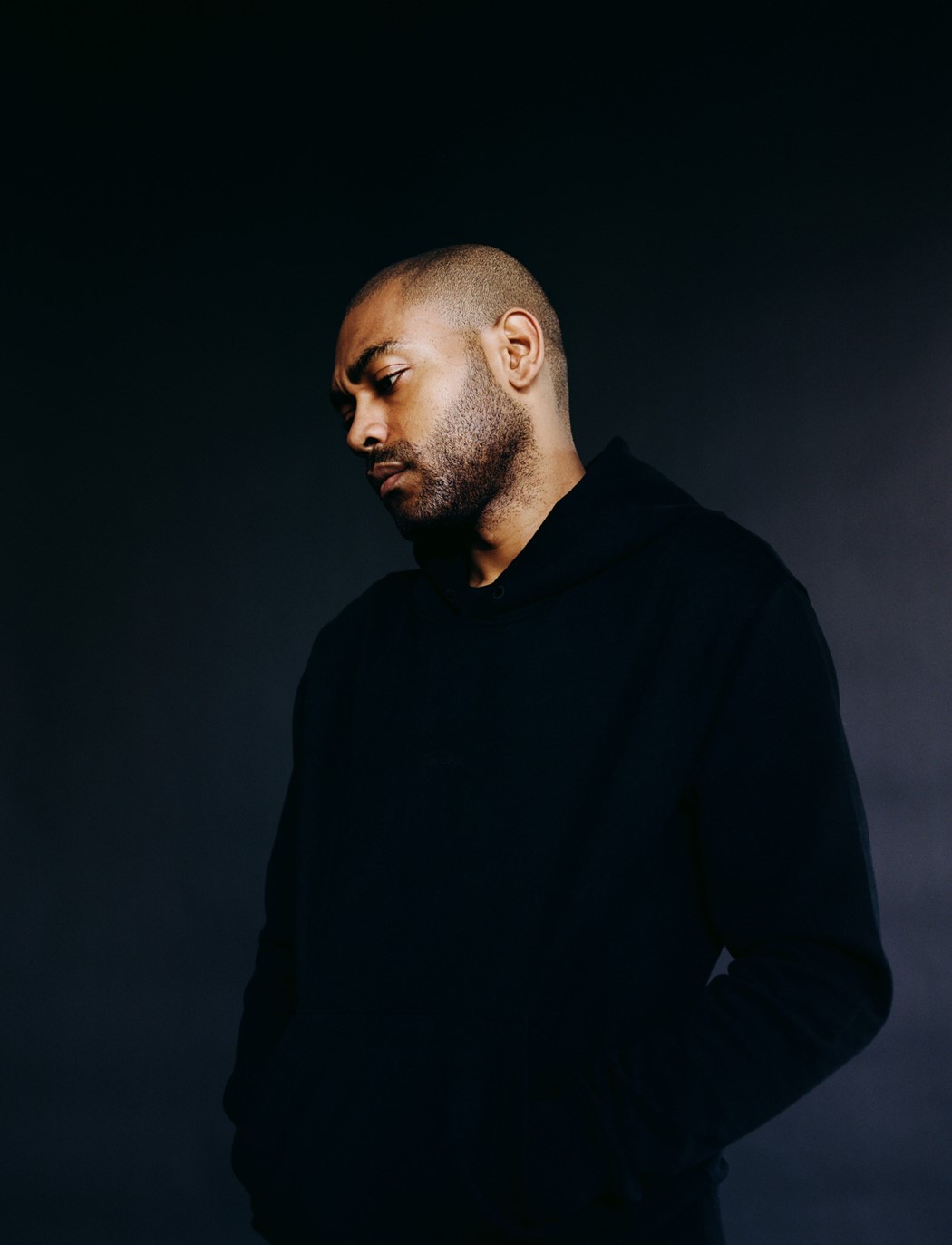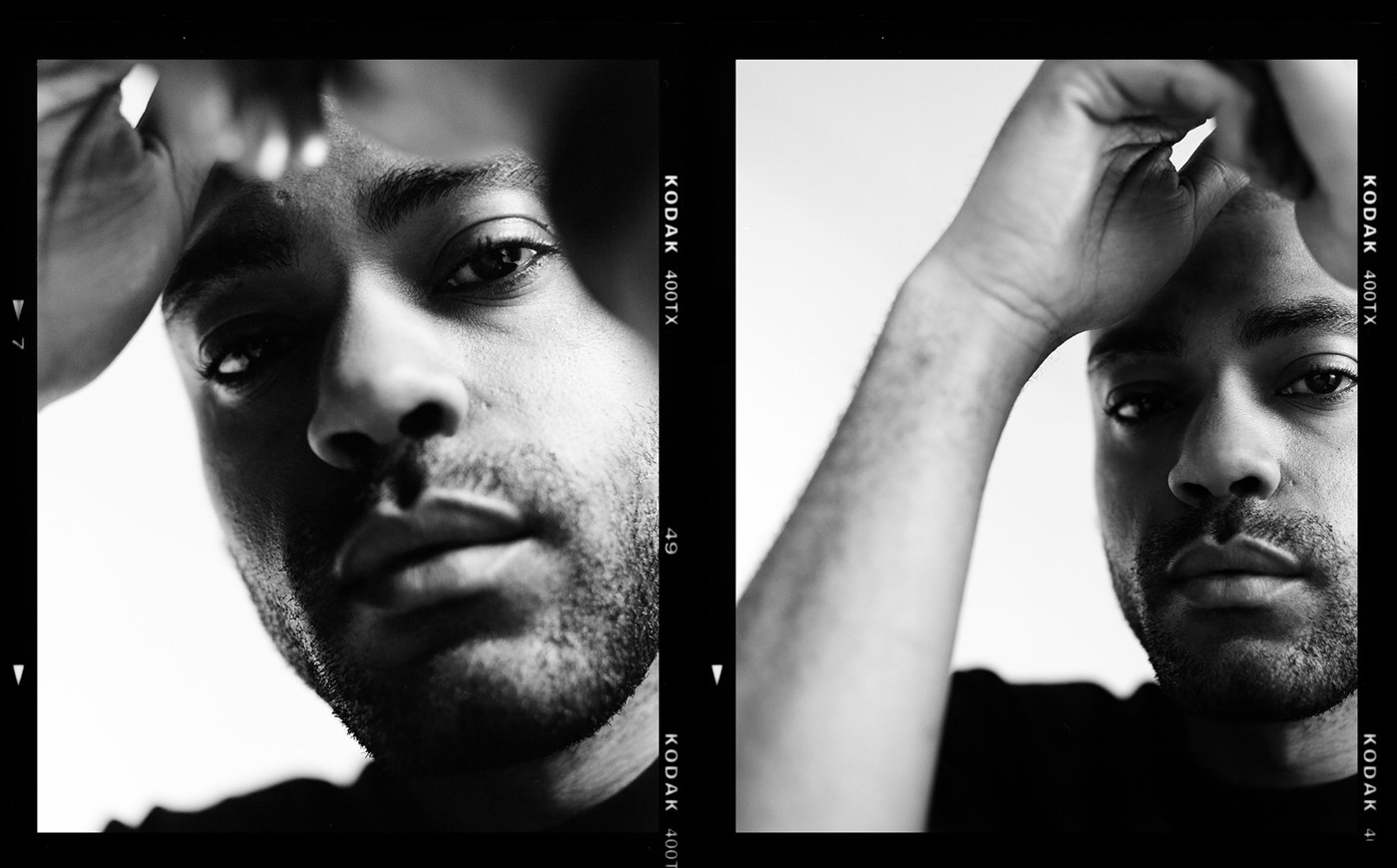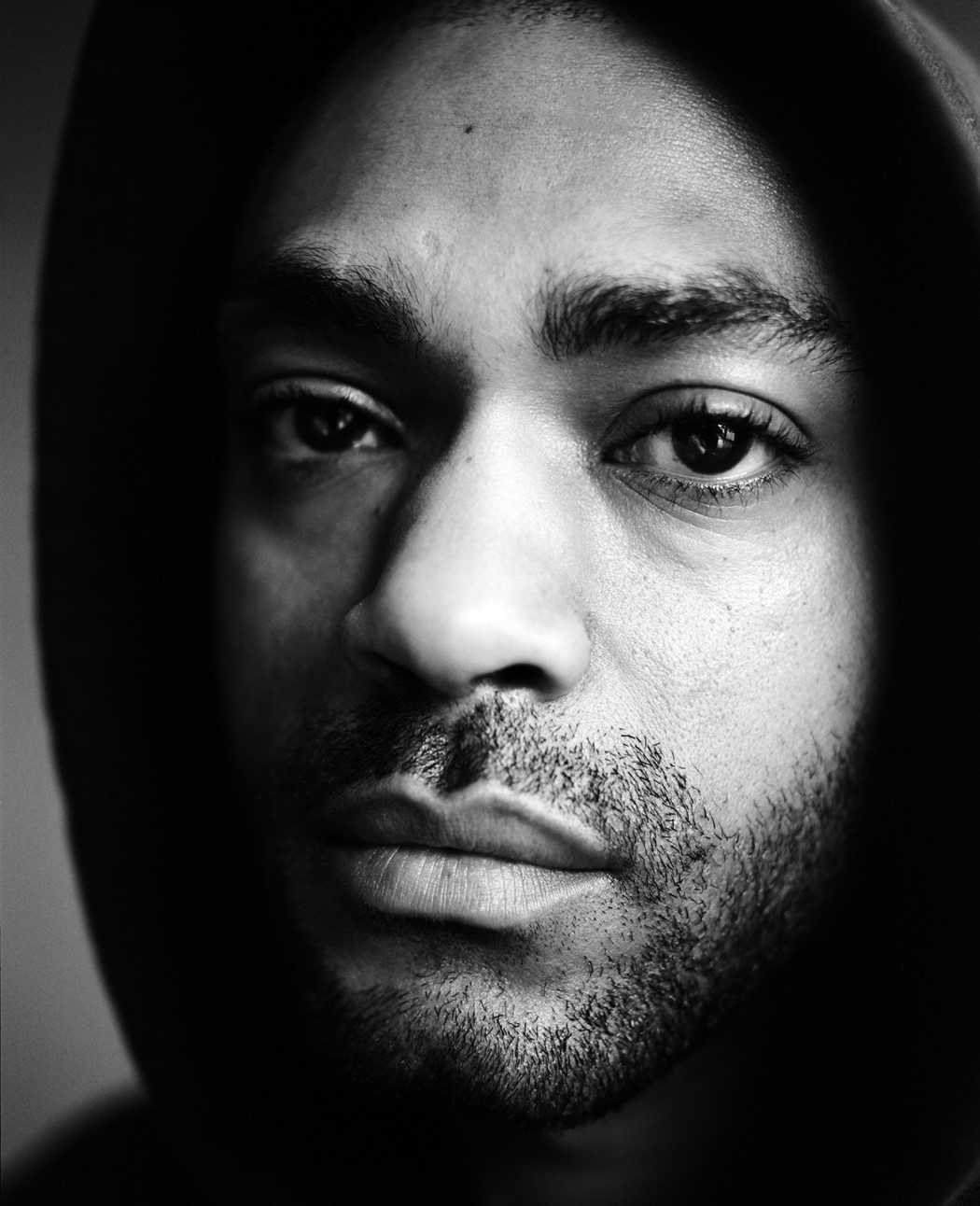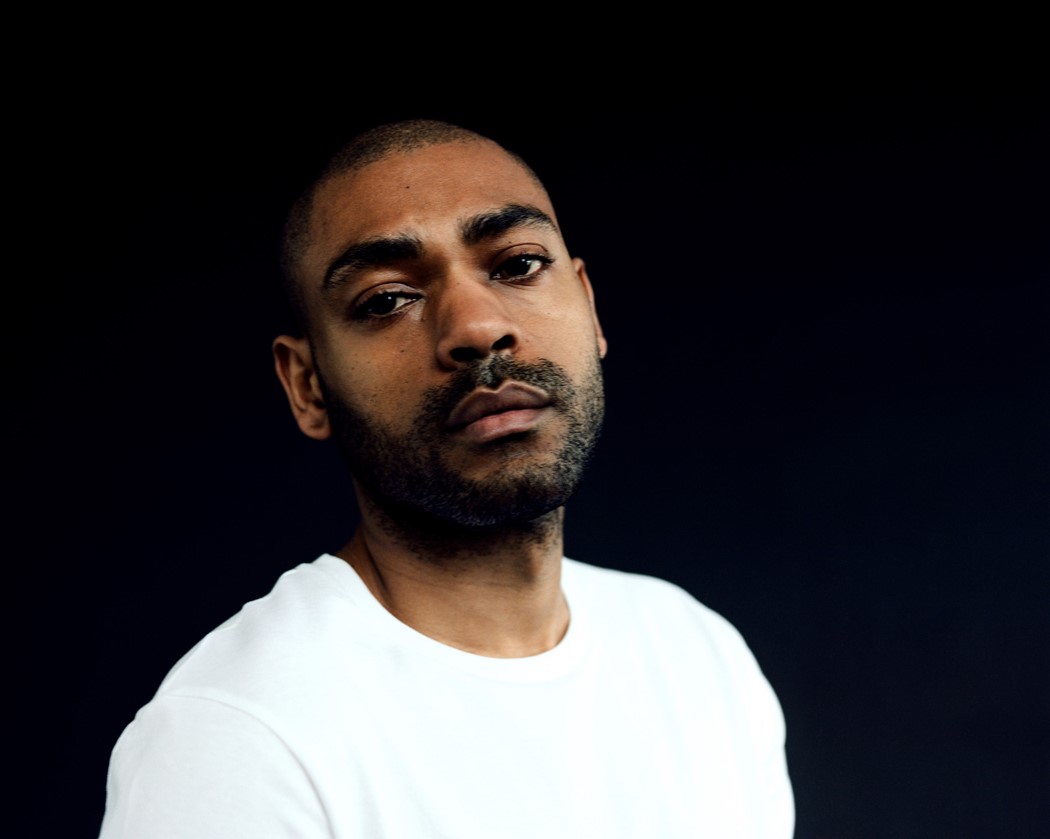Kano, Interviewed by Caleb Femi
- PhotographyOlivia Rose
Kano opens up to Caleb Femi about Top Boy and his new album Hoodies All Summer, as well as his relationship with the ends and the “consuming” experience of constantly thinking about what could go wrong
Caleb Femi: I just want to say it off the bat, that this album feels like you’ve narrated my life, the life of my bredrins, everyone who I know, and you’ve literally captured it on just ten tracks like–
Kano: Yeah ten–
Caleb Femi: How do you find the discipline?
Kano: Yeah, it took a lot of discipline, a lot of... being harsh. You know what I mean? You know what, I’ve always wanted a ten-track album. I’ve always loved ten-track albums – Illmatic and many more. But a lot of times I’ve started an album and been like ‘I want this to be a ten-track album’ but then you get scared towards the end thinking, ‘Is it enough?’ Especially with an artist like me who doesn’t release albums every year. People are like ‘They’ve waited for years, can you give them ten tracks?’ Other people are doing 15–18 tracks. Chris Brown is doing 18 or 40. [laughs]
Caleb Femi: I think the real true talent of an artist is them being able say so much within such a limited space. And that was done perfectly. You talk about so many things: youth violence, gentrification, the ASBOs in black music, generational and systematic failure. You’re not just talking about you, you’re talking about people who have come before you. You talk about poverty, like systemic poverty, working class mobilisation – all those things. It feels like the album is an intimate conversation that you’re having with the streets. It’s not preachy, you’re putting your arms around the youth and telling them ‘Listen, I understand the situation but I’m trying to inspire you to strive for better’. It feels like you’re talking to us. You even say it – there’s a bar where you say ‘these are my words to us’.
Kano: Yep. ‘These are my words to us.’ That was important for me, to make a point on certain things and to evaluate certain things but not to seem that I’m above it, looking down and being critical. It’s not about that, not about being preachy. It’s a dialogue. It’s a conversation. I feel like great art at times, poses more questions than gives answers. I’m not giving a solution, this is my experience and if I can share my experience with people that are from where I’m from, that’s important. It’s not about [imitative voice] ‘stop doing this bro’ and ‘what the fuck is that about?’ It’s not just about that and at times I worry about doing press and having this conversation in a world where it doesn’t involve the people being spoken about. Music is my way to talk directly to the streets, to the youths, to London, to the UK. That’s my way, you know. It’s like I get it. You know what I mean? I understand.
“I worry about doing press and having this conversation in a world where it doesn’t involve the people being spoken about. Music is my way to talk directly to the streets, to the youths, to London, to the UK” – Kano
It’s like people say ‘You gotta put the knives down’ but they don’t get into the psychology and what goes through someone’s mind when they feel the need to carry a knife because you’ve never been in a situation like that. That’s why on Trouble I say ‘these gunshots never reach your town’.
It’s just something some people can’t understand. I think it takes people like me to help make that connection and be that bridge to a world that some of these people aspire to go. It’s like when they talk about youth violence, it’s a period in someone’s life, it’s a phase we’ve seen in people growing up.
As you get older, you’ve seen people get through that and become the grown ups that they are today and I really think it’s heart-breaking for someone to lose their life during that period and that loss of potential is something that really saddens me. I don’t know man, it’s just about empathising with people’s situations.
Caleb Femi: You seem to have a delicate relationship with the ends that you talk about throughout. What’s your relationship now as like – The Kano – with the ends and more specifically what’s your relationship like with newer artists?
Kano: I guess my relationship is that I’m fully aware that I’m not on the road, I’m not in the ends at all times. I’m a working man, I’m getting on with my life. But I’m not fucking Puffy Daddy and moving my whole family out to like wherever.
That’s what we aspire to, this sort of [imitative voice] generational success within your family. It’s not that yet. Our parents came to this country, and we’re the next ones going. We’re trying to make it better.
So, I find myself in a position where one minute I’ll be at some award show with Damon Albarn receiving the Pioneers Award, and the next day I’m just chilling at my cousin’s yard, and just hearing them talk and what they’re on, and what that conversation is.
‘This man just got stabbed you know, he just got eight years, you know, or he just got 30.’
This that, watching it on the TV. We have conversations and so that’s like my connection to what’s going on. In certain peoples’ lives, it’s hard to criticise when you can’t come with an answer. I very much love where I’m from, I’m true to it and I wanna inspire, cos I know what’s out there. I know what a young person with potential can achieve.

Caleb Femi: I’m going to talk about some of the specifics you mentioned. There’s a bar in Good Youtes Walk Amongst Evil. Can I just say that title is so gang! It captures everything I was thinking to myself. I know that when it drops it’s going to be everywhere. All the mandem are going to gravitate towards that line.
You said ‘warfare with nowhere to run’ and that really captures this conversation and the experience of PTSD [post-traumatic stress disorder]. Young people experience a lot of trauma in the ends but they can’t leave the ends whereas when soldiers go to war, they go to a place where they experience trauma but then they come home and are removed from that environment, that at least allows them to have a chance to recover.
Kano: Yeah. So, they can begin to process and deal with it. In a way I guess, people feel trapped and it’s something you can’t run away from. I just know there is probably thousands of kids that might have a problem at school, and they might like ‘shit after school it’s going to be mad’ and parents are like ‘you better fucking go to school!’ As you would.
But nowadays what bothers me, is it’s not necessarily a fistfight; when I was young anyway, a stabbing was still quite rare. You know what I mean? But not being able to remove yourself from that situation.
‘I have to go.’
‘I have to walk to school this way or walk home that way.’
‘I have go past these people.’
‘This is where I have to be.’
“I’m always constantly thinking what could happen or what could go wrong. That is like so consuming” – Kano
And it’s very close. Especially in Newham, when I was growing up. Everyone was like ‘Newham!’ And now it’s like East Ham, Canning Town and Stratford and everyone’s like beefing each other but they all share like a Barking Road, and it’s like you can’t go to that barber shop or that barber shop. It’s crazy. It’s deep.
Even in my professional life, or going about my business day-to-day, I might be at my car at a traffic light, with a little distance between my car and the car in front and I know I can swerve off left if I needed to. The person next to me isn’t thinking like that. The person I just had a meeting with isn’t thinking like that. Fucking hardly anyone in the environments that I’m moving in now is thinking like that.
Like we’ll all be in a bar or a pub, I don’t smoke, but people wanna go out and smoke, and they are telling me to come out and have a cigarette and sometimes I feel like it will sound like I’m a prick if I don’t want to. They don’t look at ‘hanging out in the corner’ the way I do. I’m always constantly thinking what could happen or what could go wrong. That is like so consuming.
Just thinking like that takes up so much space in your mind, it doesn’t allow you that clarity or freedom to go where you want. People don’t see that as a luxury, they go where they want. They put their clothes on and just walk to the station and get off at any station they want and go to work or whatever. They don’t think about this stuff. But a young kid, or people from places where we’re from who are trying to make it in the business. These things are constantly on their mind. It’s constant. It’s mad.
Caleb Femi: I’m so glad you said that bruv–
Kano: It’s constant. Like where is the car? Is the car outside? Is it outside outside? Do I have to walk a distance to get the car? Most people are like ‘just walk up there’. [laughs]
Caleb Femi: Literally! [laughs]

Kano: Everyone thinks it’s cool until something goes wrong bruv.
Caleb Femi: You’re constantly thinking about not slipping. Constantly. It’s constantly a risk assessment. I’m so glad you said that because I feel like it’s something only people who have come from that, would know what this feels like. That’s something that doesn’t get talked about. At the end of Class of Deja, which is – well we’ll talk about that. But you say ‘tryna stay out of harm’s way but trouble keeps on missed – calling me’. You are aware that as someone who is successful and who has made it out the ends, this is never a closed door.
Kano: It is never a closed door. You’re right.
Caleb Femi: It made me think of Nipsey Hussle. Someone who has come out of their ends but then come back to their ends to try and do something–
Kano: It seems like to us doing all the right things, and all the things that you’d say a rich, successful rapper should do. You know what I mean? You could not criticise him on that level. But he paid the price for it.
Caleb Femi: That’s something that’s on your mind, that trouble can find you, just by being who you are.
Kano: Yeah, no matter how positive you try and be. Not everyone sees it the same. Everyone is different. Like I would say if I was young and I saw Rio Ferdinand. He used to come to my barber shop for West Ham at that time. He used to pull up outside and park on the double yellow line and walk in front of whoever’s next.
“I still don’t know how much I believe in [politicians], to be honest. And I don’t really know how in touch they are with working-class people – black or white” – Kano
Caleb Femi: [laughs]
Kano: I used to be like, yeah, that’s going to be me one day. I don’t have to wait in the queue. You can take it like that. That’s maybe because I had aspirations to be a musician and make it that way. But if you haven’t got the aspiration just because of your circumstances, and just feel like I’m not supposed to be anything and life’s never going to get better. Like my mum never had any money, how is it going to change? You might then look at that situation [Rio] and think ‘who the fuck does he think he is? Walking in front and that. Parking in his fucking nice car that he worked hard for. I don’t give a shit. What you doing in the ends? What you doing round here bruv?’
Some people really look at it like that. You just don’t know. A lot goes into that way of thinking. I don’t believe that’s how you should think but I can’t knock that way of thinking. No matter how much of a positive person you are, there still could be that possibility of someone being that way. At that moment they see everything that haven’t got. Rather than thinking, oh wait–
‘He’s from around here? There’s a possibility I can be like that, and there’s no stopping me. If he could do it, then maybe I could.’
There is always two ways of looking at things.
Caleb Femi: That’s a good segway into the conversation about poverty. How youtes are seeing you in the AMG, and there’s a line I have to keep wheeling up, like ‘rah, you put it in there but you didn’t make space for it’. There are some lines that you make space for cos of how strong it is. But this one is part of everything else.
Kano: I know exactly what you mean.

Caleb Femi: It was so powerful to me. You talk about the sharpie. Which song is it?
Kano: Oh, it’s SYM–
Caleb Femi: Yes, that’s the one! What does it mean to be poor and black in Britain? To be young, poor and black? Cos you’re from there, you know.
Kano: Sometimes, you only realise when you see other people’s life. And hear about other people’s upbringing. I think a lot of people accept their life circumstances and their surroundings as normal. But it’s not necessarily. For me specifically, I had a lot of love growing up and that was from a single parent as well.
My mum had two sisters, and two brothers, and we were all one in house. It was always family-oriented, a lot of love around. I didn’t need anything. I didn’t want anything. It was only as I got older that I saw things, like my mum and her neighbour putting their money together to feed us, or sometimes my mum would have change to cook and feed us and the neighbours, sometimes it was the other way around. Or going to McDonalds with my brother and my mum didn’t get nothing. It’s only when you think back and you remember all the ‘no don’t worry, I won’t get nothing’, even though she was starving.
Caleb Femi: So, family was a real important aspect in that–
Kano: Really important. I have to rate my mum cos she still gave us experiences. We used to go on holiday, like home back to Jamaica, but we all used to go. It’s only as I get older that I realise how much that must have cost and how hard that must have been. She wasn’t working all the time. That experience of seeing something else, and that’s part of how I fell in love with music, being in Jamaica, listening to dancehall. Going to the shows, watching the performances and hearing the live band with Tiger, and how the crowd was going mad for him.
That’s when I really first fell in love with music. That was my experience. You don’t really know when you’re young. You just wanna go out and play football with your mates and all that. I didn’t have it as bad as other people in my class.
“For this upcoming season [of Top Boy], I wanted to show the human being in this character and what goes into these decisions... I feel it’s important for me to not have it be one-dimensional” – Kano
Caleb Femi: It’s not all doom and gloom, ‘feel sorry for me’. Just that this is the situation. We had family, we had music, there were other things. There is a level of humanity to it.
Kano: Yeah, and that’s very important for me. It made up for a lot.
Caleb Femi: Politicians seem to have a very interesting message. Let’s talk about them. Politicians. Respond in whichever way you want. Asking a question might be too leading.
Kano: It’s a mad one. I never paid too much attention to politics growing up. It’s probably the last couple of years that I have. I think I voted for the first time, a couple of years back. I still don’t know how much I believe in any one of them, to be honest. And I don’t really know how in touch they are with working-class people – black or white. But it’s a mad one.
They have a lot to answer for and could do a lot more. I don’t want certain communities to be reliant on them. Obviously, you have Grenfell, which is a major fuck up and it’s because people are poor. For other things we just need to have more of a dialogue with ourselves. I don’t know man. I was watching this Windrush documentary, I don’t know if you saw it–
Caleb Femi: The one on BBC?
Kano: Yeah. Just to see the politics then, and then Windrush has come up again, and my Mum is part of that. Just to see the legislation and what was written in black and white. That was kind of crazy and that was a Labour government back then. It was wild, like ‘Caution!’ in letting these people into the country and know they’ll be woven into the fabric of this country forever and it cannot be reversed. ‘It’s like we have to really think about who we let in.’ It’s mad. Sometimes it feels like politics is fighting against us. Not working out for everyone. I don't know what else to say about it man.
Caleb Femi: Was it Darcus Howe at the beginning of Trouble?
Kano: Yeah.
Caleb Femi: I’m happy I clocked that.
Kano: Oh, you knew? Yeah, I didn’t know much about it before. I was searching and found something that was so relevant.
Caleb Femi: He’s not necessarily saying don’t do crime because of duh duh duh, he’s like I understand the reasons why you’re doing it.
Kano: He was talking about police brutality and prison brutality. ‘A whole wastage of human creativity’ and that loss of potential. The amount of creativity that is not allowed to flourish because of people’s circumstances.
Caleb Femi: You’re still in Top Boy and the character you play is relevant to what we’re talking about today. It’s nice that you’re sensitive to that.
Kano: I’m still conflicted. But I can show you both sides of the fence. I would say going into this next season, it was something I was a little cautious about. I know with the character I play and if you look at Top Boy on a surface level, I’m the one who is straight-up violent, and it’s all about the streets, and they all love that guy.
I never had a problem with Top Boy as a whole, because it was so multi-layered and had good stories and consequences for actions. Maybe not consequences on my character’s part before this season. For this upcoming season, I wanted to show the human being in this character and what goes into these decisions. And without giving too much away, the consequences from his actions. I feel it’s important for me to not have it be one-dimensional.
I know how powerful imagery is and I know how powerful lyrics are. At the time I thought ‘Am I portraying the right message through this character for a whole generation to see?’ You have to do it wholeheartedly. You got to believe in and do it convincingly.
Kano’s new album Hoodies All Summer is out now. His UK tour commences January 31, 2019.












